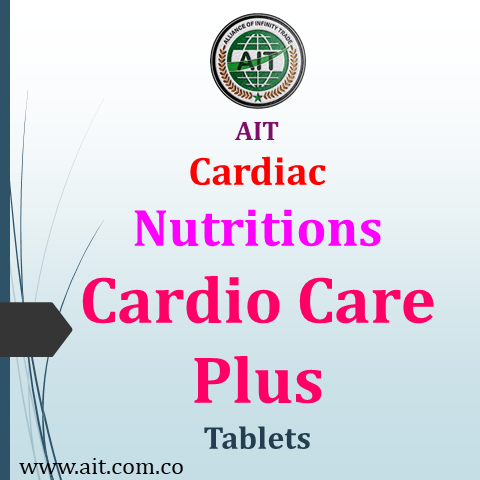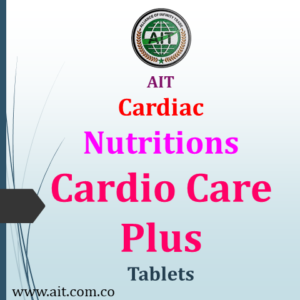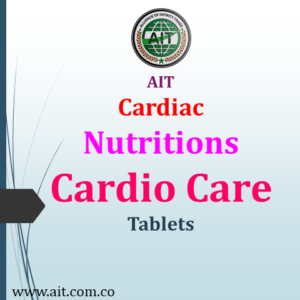Alliance of Infinity Trade
AIT Cardiac Nutritions Cardio Care Max Tablets
Elevate Your Heart Health with Cardio Care Capsules!
Introduction:
Welcome to AIT Nutraceuticals Division, where we prioritize cardiovascular wellness through our innovative Cardio Care Supplement Range. Developed by our dedicated R&D Department, these supplements are meticulously formulated to provide comprehensive support for heart health. Our commitment to excellence and quality ensures that each capsule is packed with essential nutrients to nourish your heart and optimize cardiovascular function. With AIT, you can trust that your heart health is in good hands.
Share
Importance of Nutrition for Cardio Care Health:
Maintaining optimal nutrition is essential for promoting cardiovascular health and reducing the risk of heart disease. The Cardio Care Supplement Range is specifically designed to fill nutritional gaps and provide vital nutrients that support heart function, regulate cholesterol levels, and reduce inflammation. By incorporating these supplements into your daily routine, you can proactively protect your heart and enhance overall well-being.
Product Preview:
Introducing AIT Cardiac Nutritions Cardio Care Max Tablets, a holistic approach to cardiovascular wellness. With 31 meticulously selected ingredients, our Cardio Care Supplement Range offers comprehensive support for heart health. From essential vitamins and minerals to omega-3 fatty acids and Krill Oil capsules, each component is chosen for its specific benefits in cholesterol management, circulation, and antioxidant protection. Take control of your cardiovascular health with our advanced formula, designed to promote vitality and longevity.
Blister Type 01:- Micronutrient Capsules
Certainly! Below are the detailed descriptions of each ingredient in the AIT Cardiac Nutritions Cardio Care Tablets:
-
- Phytosterols (867 mg):
Potential Usage and Benefits: Phytosterols are plant compounds that resemble cholesterol structurally and can help lower LDL (bad) cholesterol levels. By inhibiting the absorption of cholesterol in the intestines, phytosterols support cardiovascular health by reducing the risk of heart disease and promoting healthy cholesterol levels. - Omega-3 fish oil (333 mg), Providing: EPA (170 mg), DHA (30 mg):
Potential Usage and Benefits: Omega-3 fatty acids, including EPA and DHA, are essential for heart health. They help reduce triglyceride levels, lower blood pressure, decrease inflammation, and prevent plaque buildup in the arteries, ultimately reducing the risk of heart disease and improving overall heart health. - L-Carnitine Tartrate (40 mg):
Potential Usage and Benefits: L-Carnitine is an amino acid derivative that supports energy production and heart function. It helps transport fatty acids into the mitochondria, where they are converted into energy. L-Carnitine supplementation may improve exercise tolerance, heart function, and symptoms of angina. - Coenzyme Q10 (10 mg):
Potential Usage and Benefits: Coenzyme Q10 is a powerful antioxidant that is naturally produced in the body and is essential for cellular energy production. It supports heart health by improving energy metabolism in cardiac cells, reducing oxidative stress, and enhancing overall cardiac function. - Tomato Extract (6% Lycopene) (8 mg):
Potential Usage and Benefits: Lycopene is a potent antioxidant found in tomatoes that supports heart health by reducing inflammation, lowering LDL cholesterol levels, improving blood vessel function, and protecting against oxidative damage to the heart. - Alpha Lipoic Acid (30 mg):
Potential Usage and Benefits: Alpha lipoic acid is a powerful antioxidant that helps neutralize free radicals and reduce oxidative stress, supporting heart health. It also improves blood sugar levels, endothelial function, and insulin sensitivity, all of which are important for cardiovascular health. - Resveratrol (Grape Skin Flavonoids) (13 mg):
Potential Usage and Benefits: Resveratrol is a polyphenol found in grapes and red wine that supports heart health by reducing inflammation, lowering LDL cholesterol levels, improving blood flow, and protecting against oxidative damage to the heart. - Garlic Extract (67 mg):
Potential Usage and Benefits: Garlic has been used for centuries for its medicinal properties, including its ability to support heart health. It helps lower blood pressure, reduce cholesterol levels, prevent blood clot formation, and improve circulation, all of which contribute to a healthy cardiovascular system. - Beta Carotene (2 mg):
Potential Usage and Benefits: Beta carotene is a precursor to vitamin A and acts as an antioxidant that supports heart health by reducing oxidative stress and inflammation, protecting against cardiovascular disease, and supporting overall cardiovascular health. - Vitamin D (as D3 280 IU) (7 μg):
Potential Usage and Benefits: Vitamin D plays a crucial role in heart health by regulating blood pressure, reducing inflammation, improving blood vessel function, and supporting overall cardiovascular health. Adequate vitamin D levels have been associated with a lower risk of heart disease and improved heart function. - Vitamin E (33 mg):
Potential Usage and Benefits: Vitamin E is a potent antioxidant that helps protect cells from oxidative damage and reduce inflammation, both of which are important for heart health. It also improves blood vessel function, prevents blood clot formation, and reduces the risk of heart disease. - Vitamin C (40 mg):
Potential Usage and Benefits: Vitamin C is a powerful antioxidant that helps protect against oxidative stress and inflammation, both of which can contribute to heart disease. It also supports healthy blood vessel function, collagen synthesis, and immune function, all of which are important for cardiovascular health. - Thiamin (Vitamin B1) (7 mg):
Potential Usage and Benefits: Thiamin is a B vitamin that plays a crucial role in energy metabolism and nerve function. It helps convert carbohydrates into energy, supports healthy heart function, and protects against oxidative damage to the heart. - Riboflavin (Vitamin B2) (1.1 mg):
Potential Usage and Benefits: Riboflavin is a B vitamin that is important for energy production, metabolism, and antioxidant activity. It helps convert food into energy, supports heart health, and protects against oxidative stress, ultimately contributing to cardiovascular health. - Niacin (Vitamin B3) (16 mg):
Potential Usage and Benefits: Niacin is a B vitamin that helps improve cholesterol levels, reduce inflammation, and support heart health. It helps raise HDL (good) cholesterol levels, lower LDL (bad) cholesterol levels, and reduce triglyceride levels, all of which are important for cardiovascular health. - Vitamin B6 (7 mg):
Potential Usage and Benefits: Vitamin B6 is a B vitamin that plays a crucial role in energy metabolism, neurotransmitter synthesis, and homocysteine metabolism. It helps reduce inflammation, support heart health, and prevent the buildup of homocysteine, a risk factor for heart disease. - Folic Acid (267 μg):
Potential Usage and Benefits: Folic acid is a B vitamin that is important for heart health as it helps reduce homocysteine levels, lower the risk of blood clots, and improve blood vessel function. It also supports healthy red blood cell production and DNA synthesis, contributing to overall cardiovascular health. - Vitamin B12 (13 μg):
Potential Usage and Benefits: Vitamin B12 is a B vitamin that is essential for nerve function, DNA synthesis, and red blood cell production. It helps reduce homocysteine levels, support heart health, and prevent anemia, all of which are important for cardiovascular health. - Zinc (7 mg):
Potential Usage and Benefits: Zinc is a mineral that plays a crucial role in immune function, wound healing, and antioxidant activity. It helps reduce inflammation, support heart health, and protect against oxidative damage to the heart, ultimately contributing to cardiovascular health. - Copper (660 μg):
Potential Usage and Benefits: Copper is a trace mineral that is important for heart health as it helps maintain healthy blood vessels, support red blood cell formation, and protect against oxidative stress. It also plays a role in energy metabolism and collagen synthesis, contributing to overall cardiovascular health. - Manganese (0.3 mg):
Potential Usage and Benefits: Manganese is a trace mineral that is important for antioxidant activity, bone health, and blood sugar regulation. It helps reduce inflammation, support heart health, and protect against oxidative damage to the heart, ultimately contributing to cardiovascular health. - Selenium (67 μg):
Potential Usage and Benefits: Selenium is a trace mineral that is important for heart health as it helps reduce inflammation, support thyroid function, and protect against oxidative stress. It also plays a role in immune function and antioxidant activity, contributing to overall cardiovascular health. - Chromium (67 μg):
Potential Usage and Benefits: Chromium is a trace mineral that is important for blood sugar regulation and insulin sensitivity. It helps improve glucose metabolism, reduce insulin resistance, and lower the risk of heart disease, ultimately supporting cardiovascular health. - Lecithin (27 mg):
Potential Usage and Benefits: Lecithin is a fatty substance that contains phospholipids, including choline and inositol, which are important for heart health. It helps emulsify fats, prevent the buildup of cholesterol and plaque in the arteries, and improve cholesterol metabolism, ultimately supporting cardiovascular health.
- Phytosterols (867 mg):
Each ingredient in the AIT Cardiac Nutritions Cardio Care Tablets is carefully selected to support heart health and may contribute to various aspects of cardiovascular function. From reducing inflammation and oxidative stress to supporting energy metabolism and blood sugar regulation, these ingredients work together to promote overall cardiac health and reduce the risk of heart disease.
Blister Type 02:- Omega 3 and 9 Capsules
-
- Krill Oil (500 mg):
Potential Usage and Benefits: Krill oil is a rich source of omega-3 fatty acids, primarily EPA and DHA, which are known for their cardiovascular benefits. EPA and DHA help reduce triglyceride levels, lower blood pressure, decrease inflammation, and prevent plaque buildup in the arteries, ultimately supporting heart health. - Providing: Marine Phospholipids (200 mg):
Potential Usage and Benefits: Marine phospholipids, found in krill oil, play a role in enhancing the absorption of omega-3 fatty acids. They help facilitate the transport of EPA and DHA across cell membranes, ensuring their efficient utilization by the body for cardiovascular support. - Total Omega-3 (110 mg):
Potential Usage and Benefits: Omega-3 fatty acids are essential for heart health, and the total omega-3 content in krill oil provides a combination of EPA and DHA. These fatty acids help reduce inflammation, lower triglyceride levels, improve blood vessel function, and protect against cardiovascular disease. - EPA (Eicosapentaenoic Acid) (60 mg):
Potential Usage and Benefits: EPA is a type of omega-3 fatty acid that plays a crucial role in cardiovascular health. It helps reduce inflammation, lower triglyceride levels, decrease blood clot formation, and improve overall heart function, ultimately supporting cardiovascular health. - DHA (Docosahexaenoic Acid) (27.5 mg):
Potential Usage and Benefits: DHA is another omega-3 fatty acid found in krill oil that supports heart health. It helps improve brain function, reduce inflammation, lower triglyceride levels, and enhance cardiovascular health by supporting blood vessel function and reducing the risk of heart disease. - Astaxanthin (40 µg):
Potential Usage and Benefits: Astaxanthin is a potent antioxidant found in krill oil that provides additional cardiovascular benefits. It helps reduce oxidative stress, protect against inflammation, improve blood flow, and support overall heart health by preventing damage to the cardiovascular system. - Omega-9 (40 mg):
Potential Usage and Benefits: Omega-9 fatty acids, while not as well-known as omega-3 fatty acids, also contribute to heart health. They help reduce LDL (bad) cholesterol levels, increase HDL (good) cholesterol levels, lower triglyceride levels, and improve overall heart function, ultimately supporting cardiovascular health.
- Krill Oil (500 mg):
Each ingredient in the AIT Cardiac Nutritions Cardio Care Tablets is carefully selected for its unique contribution to heart health. From omega-3 fatty acids and marine phospholipids to astaxanthin and omega-9 fatty acids, these components work together to provide comprehensive cardiovascular support, reduce the risk of heart disease, and promote overall heart health.
Indications: Our Cardio Care Capsules are indicated for individuals seeking comprehensive nutritional support for cardiovascular health.
Usage: Take two Micronutrient Capsules and one Red Krill Oil Capsule daily with a meal, or as directed by a healthcare professional.
Dosage: Two Micronutrient Capsules and one Red Krill Oil Capsule daily.
Available Form: Capsules.
Packing: Our products are designed and packaged according to the specific requirements of the importing country, ensuring convenience and compliance for our customers.





Reviews
There are no reviews yet.